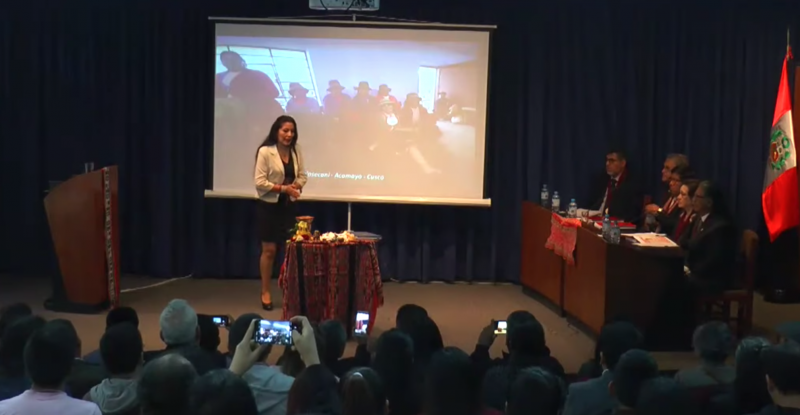On Monday, October 15, 2019, Roxana Quispe Collante obtained her doctoral degree in Peruvian and Latin American Literature from the National University of San Marcos of Lima (UNMSM). Her doctoral dissertation received a grade of 20, the highest grade allowed in the Peruvian educational system. But what made this dissertation defense newsworthy was that it was defended entirely in the Quechua language.
Quechua is a family of languages from the Central Andes that extends all over the Western part of South America spanning seven countries. According to 2018 data from the Peruvian National Institute of Statistics and Informatics, 13.9 percent of the Peruvian population, around four million people, are Quechua speakers.
This was, however, the first time a doctoral dissertation was defended in that language. Watch the full dissertation defense in the following video:
On the university's website the event was called historical, and provided some additional information about Quispe's dissertation:
Hito histórico para lengua quechua. Por primera vez en el Perú, se sustentó una tesis en dicha lengua para obtener el grado de Doctor en Literatura Peruana y Latinoamericana por la Universidad Nacional Mayor de San Marcos (UNMSM), que Roxana Quispe Collante aprobó con nota de 20 (excelente), en un hecho de gran trascendencia para la reivindicación de las lenguas originarias del país.
Su investigación, titulada “Yawar Para, Kilku Warak’aq, Andrés Alencastre Gutiérrezpa harawin pachapi, Qosqomanta runasimipi harawi t’ikrachisqa, ch’ullanchasqa kayninpi” (“Lluvia de sangre, transfiguración y singularidad en el mundo poético quechua del harawi cusqueño de Andrés Alencastre Gutiérrez, Kilku Warak’aq”), no solo buscó reconocer el valor literario del mencionado poeta andino y reinterpretar su poemario Yawar Para, sino devolver el vigor al quechua para fortalecerlo fuera de todo prejuicio lingüístico y cultural.
A historical milestone for the Quechua language. For the first time ever in Peru, a dissertation in that language was defended to obtain a doctoral degree in Peruvian and Latin American Literature from the National University of San Marcos (UNMSM), and Roxana Quispe Collante received a grade of 20 (excellent), in an highly transcendent event for the revindication of native languages of the country.
Her reserarch, titled “Yawar Para, Kilku Warak’aq, Andrés Alencastre Gutiérrezpa harawin pachapi, Qosqomanta runasimipi harawi t’ikrachisqa, ch’ullanchasqa kayninpi” (“Rain of blood, transfiguration and uniqueness in the Quechua poetic world of Cusquean harawi by Andrés Alencastre Gutiérrez, Kilku Warak’aq”), had the aim of acknowledging the literary value of the aforementioned Andean poet and reinterpretating his collection of poems called Yawar Para, but also to envigorate Quechua to strengthen it, free of all linguístic and cultural prejudice.
The recently graduated Doctor Quispe Collantes hails from the city of Cusco and is a university lecturer and Master in Linguistics from the Pontifical Catholic University of Peru. The blog K@wsay shares some information about her academic and professional career:
[Roxana Quispe] Habla y redacta en quechua e inglés. Además, vive interesada en estudios e investigaciones de literatura, lingüística, educación intercultural bilingüe, antropología, arte y en manifestaciones de la diversidad y el legado de la cultura quechua.
Durante su exposición, Quispe Collantes admitió que tuvo […] que “viajar a las provincias altas de Canas (al sur del Cusco) para lograr la traducción y el significado para toponimias que no encontraba por ningún lado. Les preguntaba a mis papás, a mis abuelos y docentes y no daban (con el significado)”.
[Roxana Quispe] speaks and writes in Quechua and English. In addition, she's interested in literature, linguistics, intercultural bilingual education, anthropology, art studies and research, and in expressions of the diversity and the legacy of Quechua culture.
During her presentation, Quispe Collantes admitted she had […] to “travel to the highland provinces of Canas (Southern Cusco) to obtain a translation and the meaning of toponymy she could not find anywhere. I asked my parents, my grandparents and teachers and they weren't able (to find the meaning)”.
The panel of judges was made up of Doctor Isabel Gálvez, lecturer of Quechua at the National University of San Marcos; Gonzalo Espino, Deputy Dean of Research and Liberal Studies, who was her dissertation advisor; and professors Mauro Mamani, Rómulo Monte Alto, and Dorian Espezúa.
At the end of her dissertation defense, Roxana Quispe expressed her satisfaction, which was shared by many mainstream and online media in Peru:
Me siento muy emocionada por representar a las mujeres quechuahablantes orgullosas de su cultura. Busca que el Runa Simi no solo se hable en sus comunidades, sino que acceda a la academia.
I feel really excited to represent Quechua-speaking women who are proud of their culture. My aim is that Runa Simi [“the people's language”, and the autonym of the Quechua language] is spoken not only in their communities, but also for it to have a place in academia.
The news was also highlighted in international media, such as Spain's El País and the United Kingdom's The Guardian. On the other hand, Twitter users also shared their feelings about this news:
?En los últimos 468 años nadie había escrito una tesis doctoral en alguna de nuestras lenguas indígenas en nuestro país.
?Roxana Quispe lo hizo este año. Y quiere seguir impulsando el #quechua en los ámbitos académicos ➡ https://t.co/ynROL4rjM5#CompartiendoCalidad— Sineace (@SineacePeru) October 26, 2019
In the past 468 years, no one had ever written a doctoral dissertation in any of our country's indigenous languages.
Roxana Quispe did it this year. And she wants to keep promoting Quechua in academia. #SharingQuality.
this is of huge importance. Many thanks to Roxana Quispe Collantes for being the first to write and defend her doctoral dissertation in quechua
Student in Peru makes history by writing dissertation in the Incas’ language https://t.co/PBYqiPE02V
— monique d'hooghe ♿ (@moniquedhooghe) October 27, 2019







